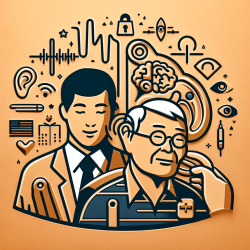The research article "Language Comprehension in Older Listeners" by Margaret Kathleen Pichora-Fuller offers critical insights into the challenges older adults face in understanding spoken language, particularly in non-ideal listening conditions. This piece not only sheds light on the complexities of auditory and cognitive changes with aging but also provides a foundation for practitioners to enhance their skills in addressing these challenges.
One of the key takeaways from Pichora-Fuller's research is the significant impact of age-related changes in both audition and cognition on language comprehension. Older adults, even those with relatively good hearing, may struggle to comprehend speech due to these changes. This understanding is crucial for practitioners who work with older populations, as it emphasizes the need for a holistic approach to audiologic rehabilitation that considers cognitive factors alongside auditory ones.
To improve practitioner skills and outcomes for older clients, the research suggests several strategies:
- Integrating Cognitive Assessments: Incorporate cognitive testing into evaluations to better understand the interplay between auditory and cognitive abilities in language comprehension.
- Creating Individualized Rehabilitation Plans: Use the insights from comprehensive assessments to tailor interventions that address both hearing and cognitive needs.
- Utilizing Assistive Technologies: Recommend and train older adults in using assistive listening devices that can mitigate some of the challenges posed by background noise and other adverse listening conditions.
- Encouraging Active Listening Strategies: Teach older clients active listening and communication strategies that leverage contextual cues and other non-auditory information to aid comprehension.
- Promoting Further Research: Engage in or support ongoing research to explore new interventions and technologies that can enhance language comprehension among older listeners.
By implementing the outcomes of Pichora-Fuller's research, practitioners can significantly improve their ability to support older adults in navigating the complexities of language comprehension. This not only enhances the quality of care provided but also contributes to the well-being and social engagement of older individuals.
For those interested in delving deeper into the intricacies of this topic and exploring the full scope of Pichora-Fuller's findings, further reading is encouraged. Language Comprehension in Older Listeners offers a comprehensive exploration of the challenges and potential strategies for addressing language comprehension difficulties in older populations.










